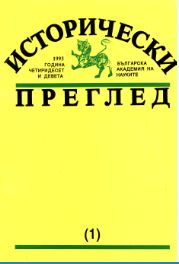Историко-летописната традиция в творчеството на йеросхимонах Спиридон Рилски
The Historical Chronicle Tradition in the Creative Work of Hieroschimonk Spiridon Rilski
Author(s): Galina IlievaSubject(s): History, Cultural history, Modern Age, 18th Century, 19th Century
Published by: Институт за исторически изследвания - Българска академия на науките
Summary/Abstract: Hieroschimonk Spiridon of Rila was one of the eminent men of letters in the Bulgarian National Revival. He was widely known for his history written, according to him, in 1792. The political elements in his creative work, text and subtext are considered in this article. For this purpose are analysed the last pages of the history where he foe the first time surveys Bulgarian history as a whole from the destruction of the Bulgarian state to his time. It is pointed out that the historical facts (the conquest of Belgrade by the Serbian rebels headed by Kara Djordje) are at variance with Spiridon’s dating in the original and, consequently, the history could not have been completed before the end of 1806. Continuity is sought between Paissii’s “Slav-Bulgarian History” and Spiridon’s History. Indirect arguments are adduced in support of the hypothesis that Spiridon was acquainted with Paissii. For the first time is demonstrated the continuity of Spiridon’s History with that of Jovan Raic of 1794–1795, from where our author had borrowed the idea of recording folk customs and songs. Another work of Spiridon, “Prophecy of Agatangela...” which is now kept in the manuscript department of the “Sts. Cyril and Methodius” National Library, № 809, is analysed. A new more recent dating is also suggested. With respect to continuity, seen also as consistency and perseverance of political intention, is indicated the difference between history and prophecy.In an article dedicated to the continuity in the creative work of a National Revival man of letters one could but refer to the achievements of those scholars who in the past succeeded in solving many important questions concerning Spiridon’s work. The first pages of the article, therefore, constitute a detailed historiographic review.
Journal: Исторически преглед
- Issue Year: 1993
- Issue No: 6
- Page Range: 116-128
- Page Count: 13
- Language: Bulgarian
- Content File-PDF

